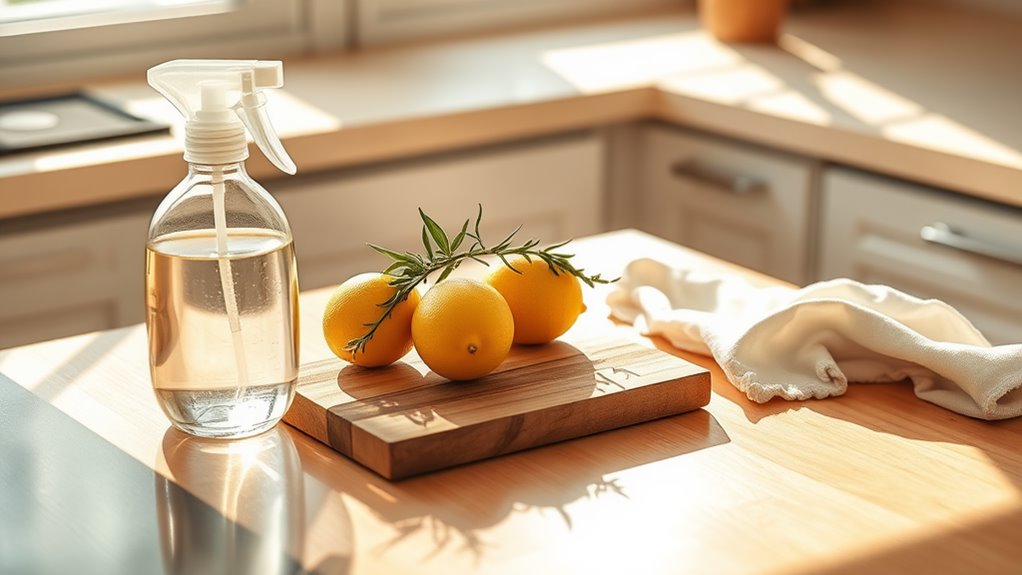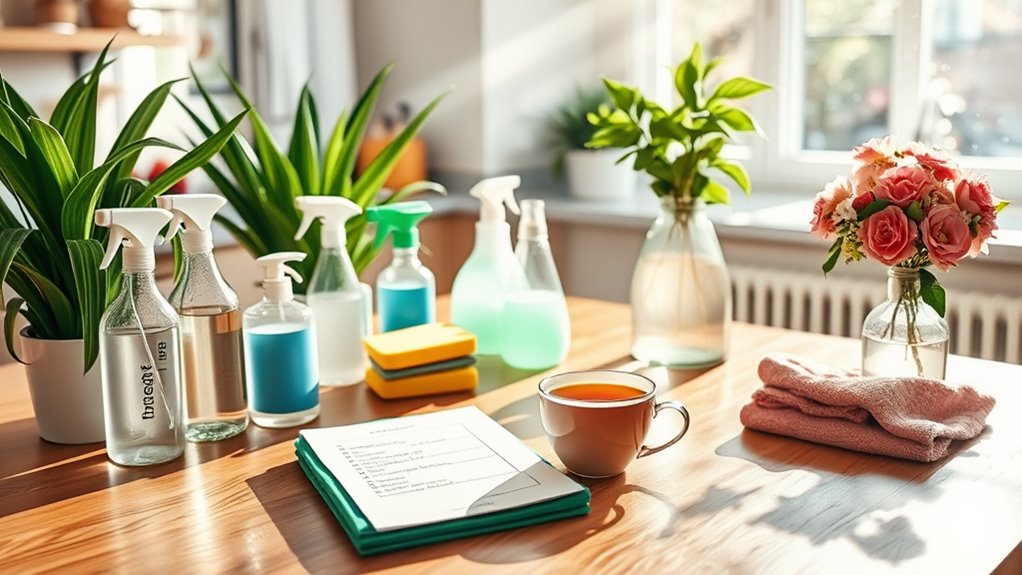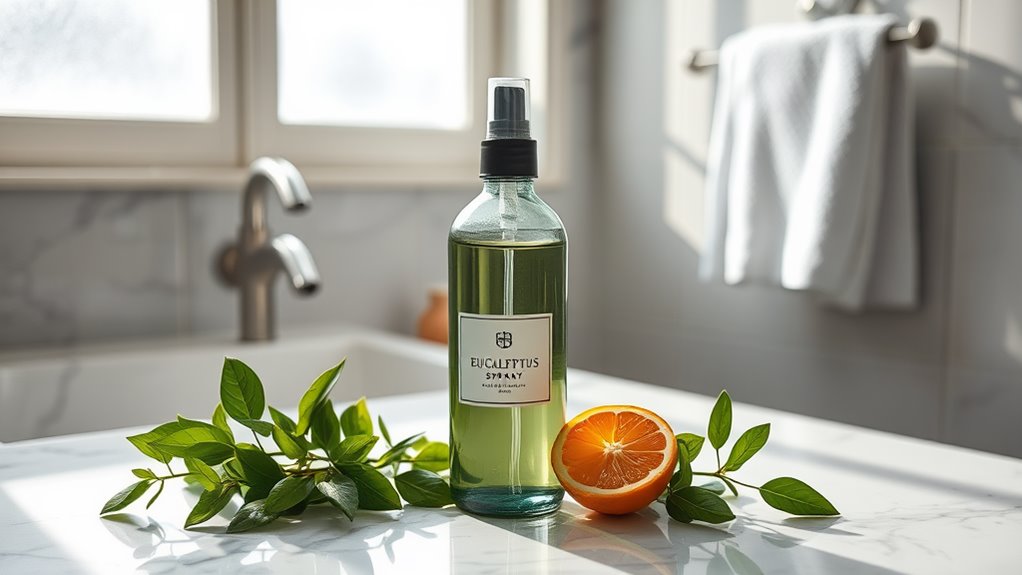The Best Way to Disinfect Counters Without Harsh Chemicals
To disinfect your counters without harsh chemicals, use natural ingredients like vinegar, baking soda, and essential oils. Mix equal parts of vinegar and water in a spray bottle, spray it on the surface, and let it sit for about 10 minutes. You can also add tea tree or lemon oil for extra antimicrobial power. For tough germs, hydrogen peroxide is effective too. These eco-friendly solutions keep your kitchen clean and safe. There’s more you can explore about DIY options!
Key Takeaways
- Use a mixture of equal parts vinegar and water in a spray bottle for effective disinfection without harsh chemicals.
- Add a few drops of essential oils, like tea tree or lemon, to enhance antibacterial properties in your cleaning solution.
- Allow the disinfectant solution to sit on surfaces for at least 10 minutes to ensure maximum germ-killing effectiveness.
- Use baking soda as an abrasive scrub for tough stains while also neutralizing odors on counters.
- Consider hydrogen peroxide for its ability to kill bacteria and viruses without leaving harmful residues on surfaces.
Understanding the Need for Disinfection
As you prepare meals and gather with family, it’s easy to overlook the importance of keeping your counters clean. However, understanding the need for disinfection is essential for your health and safety.
Food particles and bacteria can linger on surfaces, creating a breeding ground for harmful pathogens. It’s not just about aesthetics; it’s about preventing illness. When you counter disinfect regularly, you eliminate these threats, ensuring a safe environment for meal preparation. Regular cleaning routines are crucial in maintaining a high level of hygiene that protects your family from foodborne illnesses. Additionally, utilizing eco-friendly cleaning solutions can help you achieve effective disinfection without the risks associated with harsh chemicals. Using natural methods, like vinegar and steam, can be just as effective as traditional disinfectants. Furthermore, creating a safe all-natural disinfectant at home ensures that you can keep your surfaces clean without exposing your family to toxic substances.
By incorporating effective techniques and natural solutions, such as using vinegar and steam, you can achieve a high level of hygiene without resorting to harsh chemicals. Prioritize this important task to maintain a healthy home and cultivate a sense of mastery in your culinary space.
Your family deserves nothing less than a pristine kitchen.
Benefits of Using Natural Disinfectants
Using natural disinfectants offers a range of benefits that can transform your cleaning routine.
You’ll not only protect the environment with eco-friendly ingredients, but also create a healthier home for your family. By replacing harsh chemicals with natural cleaners, you can significantly reduce indoor air pollution and chemical exposure. Plus, these solutions often save you money, making them a smart choice all around. Additionally, many essential oil sprays are effective against a wide range of pathogens, making them a powerful disinfecting option for your daily cleaning tasks. Furthermore, natural disinfectants often utilize plant-based ingredients, which can be just as effective as their chemical counterparts in killing germs and bacteria. Using ingredients such as vinegar and hydrogen peroxide can enhance the disinfecting power of your cleaning routine. Incorporating eco-friendly cleaning methods can further improve your cleaning efficiency while minimizing environmental impact.
Eco-Friendly Ingredients
Natural disinfectants offer several benefits that make them an appealing choice for maintaining a clean home. Using eco-friendly ingredients not only protects your family from harmful chemicals but also contributes to environmental sustainability. You’ll find that many natural disinfectants are effective against bacteria and viruses while being safe for all surfaces.
| Ingredient | Benefits | Application |
|---|---|---|
| Vinegar | Antimicrobial, deodorizing | Wipe surfaces or dilute in water |
| Baking Soda | Abrasive, odor neutralizer | Sprinkle on surfaces, scrub |
| Lemon Juice | Antibacterial, fresh scent | Mix with water for a spray |
| Tea Tree Oil | Antiseptic properties | Add to homemade cleaning solutions |
| Hydrogen Peroxide | Effective against germs | Use in a spray bottle |
Embrace these natural options to enhance your cleaning routine!
Healthier Home Environment
When you switch to natural disinfectants, you’re not just cleaning your home; you’re also creating a healthier environment for your family.
These products are free from harsh chemicals that can trigger allergies and respiratory issues, promoting better air quality. By using natural ingredients, you reduce your family’s exposure to toxic substances, fostering a safe space for everyone, especially children and pets.
Additionally, natural disinfectants often come with added benefits, such as pleasant scents from essential oils, which can enhance your mood and overall well-being.
Adopting these eco-friendly alternatives reflects a commitment to health and sustainability, making your home a sanctuary rather than a source of potential harm.
Embrace natural disinfectants for a cleaner, healthier living space.
Cost-Effective Solutions
Switching to natural disinfectants not only promotes a healthier home environment but also offers significant cost savings. You’ll find that common ingredients like vinegar, baking soda, and essential oils aren’t only effective but also inexpensive.
By creating your own disinfectant solutions, you eliminate the need for costly commercial products filled with harsh chemicals. Plus, these natural alternatives often require fewer ingredients, simplifying your shopping list and reducing waste.
When you invest in bulk purchases of these staples, you maximize your savings and minimize environmental impact. Over time, these small adjustments can lead to substantial financial benefits, all while ensuring your counters remain safe and sanitized.
Embrace this cost-effective approach and experience the mastery of natural cleaning.
Common Natural Ingredients for Disinfecting
While many commercial cleaners contain harsh chemicals, several common natural ingredients can effectively disinfect your counters without the risks associated with synthetic products.
Lemon juice is a powerful antibacterial agent, thanks to its high acidity and pleasant scent. Additionally, using eco-friendly cleaners made from these ingredients can contribute to a healthier home environment, as they are less likely to cause damage to countertop surfaces and promote eco-friendly practices that benefit the environment. Furthermore, making your own cleaner allows you to customize the ingredients according to your needs and preferences.
Baking soda, with its mild abrasiveness, can help scrub away grime while neutralizing odors.
Essential oils, particularly tea tree and lavender, possess natural antimicrobial properties and can infuse your space with a revitalizing aroma.
Hydrogen peroxide is another excellent option; it’s effective against a variety of pathogens and breaks down into harmless water and oxygen.
Additionally, creating your own cleaner with eco-friendly ingredients allows you to avoid harmful chemicals while ensuring a clean home environment.
Vinegar: A Versatile Disinfectant
Vinegar is more than just a salad dressing; it’s a powerful disinfectant that can tackle germs effectively.
You can safely use it on food surfaces without worrying about harmful chemicals.
Let’s explore how you can create DIY vinegar cleaning solutions to keep your counters spotless and sanitized.
Vinegar’s Antimicrobial Properties
A surprising ally in your quest for a cleaner kitchen, vinegar boasts impressive antimicrobial properties that make it a powerful disinfectant. Its primary active ingredient, acetic acid, effectively disrupts the cell membranes of bacteria and fungi, rendering them inactive.
When you apply vinegar, you’re not just masking odors; you’re actively eliminating harmful pathogens. This natural disinfectant has shown effectiveness against common culprits like E. coli and Salmonella, making it ideal for your countertops.
To harness its full potential, use it undiluted or mix it with water for lighter cleaning tasks. Remember, while vinegar excels against many microbes, it’s essential to understand its limitations.
Mastering vinegar in your cleaning routine can elevate your kitchen hygiene without resorting to harsh chemicals.
Safe for Food Surfaces
When it comes to cleaning food surfaces, you want a disinfectant that’s both effective and safe.
Vinegar stands out as a versatile option. Its acetic acid content not only cuts through grease but also helps eliminate harmful bacteria, making it suitable for countertops, cutting boards, and other food prep areas.
Unlike harsh chemicals, vinegar’s natural properties guarantee that it won’t leave toxic residues behind, allowing you to maintain a clean environment without compromising safety.
Just remember to use it in a well-ventilated area and avoid mixing it with bleach, as that can produce harmful fumes.
DIY Vinegar Cleaning Solutions
If you’re looking for an effective way to clean your home naturally, DIY vinegar cleaning solutions are a fantastic choice.
Vinegar’s acetic acid offers powerful antimicrobial properties, making it an excellent disinfectant. To create your own solution, mix equal parts white vinegar and water in a spray bottle.
For added cleaning power, consider infusing your vinegar with citrus peels or herbs. This not only enhances the scent but also boosts its efficacy.
Use this solution on countertops, cutting boards, and even bathroom surfaces. Just remember, avoid using vinegar on natural stone, as it can damage the surface.
Essential Oils: Nature’s Antimicrobials
Essential oils offer a natural and effective way to disinfect your counters without relying on harsh chemicals. These potent plant extracts possess antimicrobial properties that can help eliminate harmful bacteria and viruses. Here’s a quick reference table to guide you in choosing the right essential oils for your cleaning routine:
| Essential Oil | Antimicrobial Properties |
|---|---|
| Tea Tree Oil | Antibacterial, antifungal |
| Lavender Oil | Antimicrobial, calming |
| Lemon Oil | Antiseptic, deodorizing |
| Eucalyptus Oil | Antiviral, rejuvenating |
To use these oils, simply mix a few drops with water in a spray bottle. Shake well, spray your counters, and wipe with a cloth. You’ll enjoy a fresh, clean space without toxic residues!
Hydrogen Peroxide: A Powerful Cleaner
While many people turn to commercial cleaners, hydrogen peroxide stands out as a powerful alternative for disinfecting your counters. This versatile compound effectively kills bacteria, viruses, and fungi without leaving harmful residues.
When you use hydrogen peroxide, you harness its oxidation properties to break down the cell walls of pathogens, ensuring a thorough clean. It’s safe for most surfaces, including wood and stainless steel, making it ideal for your kitchen environment.
To maximize its effectiveness, always use a concentration of 3% or higher, and consider letting it sit for a few minutes to enhance its disinfecting power.
Step-by-Step Guide to Disinfecting Counters
To keep your counters in top shape, follow this simple step-by-step guide to disinfecting them effectively.
- Clear the Surface: Remove all items from your counters.
- Prepare the Disinfectant: Mix equal parts water and white vinegar in a spray bottle.
- Spray Generously: Apply the solution evenly across the surface.
- Let It Sit: Allow it to dwell for at least 10 minutes to kill germs.
- Wipe Clean: Use a clean cloth or paper towel to wipe away the solution.
| Step | Action |
|---|---|
| 1 | Clear the Surface |
| 2 | Prepare the Disinfectant |
| 3 | Spray Generously |
| 4 | Let It Sit |
| 5 | Wipe Clean |
Safety Considerations When Using Natural Disinfectants
When using natural disinfectants like vinegar, it’s important to keep safety in mind. Always test a small area first to verify the surface can handle the solution without damage.
While vinegar is generally safe, avoid mixing it with bleach or hydrogen peroxide, as this can create harmful gases. If you have pets or small children, make sure the area is well-ventilated and that they stay away from the cleaned surfaces until they’re fully dry.
Store your natural disinfectants properly, away from direct sunlight and out of reach of children.
Finally, remember that natural doesn’t mean ineffective; use the right concentration and allow adequate contact time for maximum disinfecting power. Prioritize these precautions to maintain a safe environment.
Maintaining a Clean and Disinfected Surface
Maintaining a clean and disinfected surface is essential for preventing the spread of germs and guaranteeing a healthy environment.
You can achieve this by implementing a consistent cleaning routine and using natural disinfectants. Here are four key steps to follow:
-
Daily Wipe-Down: Use a natural solution, like vinegar and water, to wipe surfaces each day.
-
Deep Clean Weekly: Dedicate time each week for a thorough scrub of all surfaces.
-
Use Separate Cloths: Avoid cross-contamination by using different cloths for different areas (e.g., kitchen vs. bathroom).
-
Air Out the Space: Guarantee good ventilation while cleaning to allow any lingering odors to dissipate.
Frequently Asked Questions
Can I Use Natural Disinfectants on Food Preparation Surfaces?
Yes, you can use natural disinfectants like vinegar or lemon juice on food preparation surfaces. Just remember to rinse them thoroughly afterward to avoid any lingering taste or odor, ensuring your surfaces remain safe for food prep.
How Often Should I Disinfect My Counters?
You should disinfect your counters daily, especially after food prep or spills. Regular cleaning prevents bacteria buildup, ensuring a safe cooking environment. Stay consistent, and you’ll maintain a healthier kitchen effortlessly.
Are Natural Disinfectants Effective Against Viruses?
Yes, natural disinfectants can be effective against viruses, especially those containing ingredients like vinegar or essential oils. However, it’s essential to guarantee they’re used properly and in appropriate concentrations to maximize their disinfecting properties.
Can I Mix Different Natural Disinfectants?
You can mix different natural disinfectants, but be cautious. Some combinations may reduce effectiveness or create harmful reactions. Always research compatibility and test on a small area before applying your mixture broadly. Stay safe and informed!
Do Natural Disinfectants Have an Expiration Date?
Yes, natural disinfectants can have an expiration date. Over time, their effectiveness diminishes due to factors like light and temperature. Always check labels, and store them properly to maintain their potency for ideal cleaning results.



